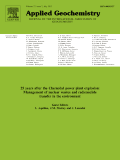
APPLIED GEOCHEMISTRY
Scope & Guideline
Shaping the Future of Environmental Chemistry through Geochemistry
Introduction
Aims and Scopes
- Environmental Geochemistry:
Exploration of the chemical composition of natural waters, soils, and sediments, and understanding the impact of human activities on these systems. - Geochemical Modeling:
Development and application of models to predict geochemical reactions and transport processes in various geological settings. - Isotope Geochemistry:
Utilization of stable and radiogenic isotopes to trace processes such as groundwater flow, contaminant transport, and mineral formation. - Mineral Exploration:
Integration of geochemical methods with advanced statistical and machine learning techniques for identifying mineral deposits. - Hydrogeochemistry:
Investigation of water quality, groundwater dynamics, and the interactions between water and geological materials in aquifers. - Geological and Environmental Remediation:
Research into the geochemical processes involved in the remediation of contaminated sites and the sustainable management of natural resources.
Trending and Emerging
- Machine Learning Applications:
The integration of machine learning techniques for data analysis, anomaly detection, and predictive modeling in geochemical studies is rapidly increasing. - Climate Change Impacts:
Research focusing on the effects of climate change on geochemical processes, including water quality and soil chemistry, is becoming more prominent. - Sustainable Resource Management:
Emerging studies aim at understanding geochemical processes related to resource extraction and environmental sustainability, particularly in the context of renewable energy. - Microbial Geochemistry:
Investigations into the role of microbial processes in geochemical cycling and remediation efforts are gaining traction. - Contaminant Mobility and Remediation:
Increased focus on the behavior of contaminants in various environments and the development of innovative remediation strategies.
Declining or Waning
- Traditional Geological Mapping:
The reliance on conventional geological mapping techniques has decreased, as more sophisticated geochemical and geophysical methods have gained prominence. - Single-Method Studies:
Research focusing solely on one geochemical method is less prevalent, with a shift towards multidisciplinary approaches that integrate various techniques. - Generalized Soil Studies:
Broad studies of soil geochemistry without specific context or application have become less common, as there is a growing emphasis on targeted studies addressing specific environmental issues.
Similar Journals

GEOCHEMISTRY GEOPHYSICS GEOSYSTEMS
Leading the Way in Earth Science Research and DiscoveryGEOCHEMISTRY GEOPHYSICS GEOSYSTEMS, published by the American Geophysical Union, is a leading open-access journal that has been at the forefront of advancing our understanding of earth sciences since its inception in 2000. With an impressive open access policy established in 2022, the journal promotes the wide dissemination of high-quality research in the fields of Geochemistry and Geophysics. Boasting a Q1 ranking in both Geochemistry and Petrology, as well as Geophysics, in the 2023 Journal Rankings, it is recognized among the top journals in its categories, positioning itself at the cutting edge of scientific inquiry. The journal has also secured notable rankings in Scopus, placing it in the 83rd percentile for Geophysics and the 71st percentile for Geochemistry and Petrology, reflecting its impact and relevance within the scientific community. Located in Washington, DC, GEOCHEMISTRY GEOPHYSICS GEOSYSTEMS serves as a vital resource for researchers, professionals, and students dedicated to the exploration of the complex interactions of geochemical and geophysical processes.

LITHOLOGY AND MINERAL RESOURCES
Elevating the Discourse in Earth SciencesLITHOLOGY AND MINERAL RESOURCES, published by PLEIADES PUBLISHING INC, is a specialized journal dedicated to advancing knowledge in the fields of economic geology, geochemistry, and petrology. With its ISSN 0024-4902 and E-ISSN 1608-3229, this journal has established itself as a critical resource for scholars and practitioners alike, examining the intricate relationships between lithology and mineral deposits, and their implications for resource management. As indicated by its positioning in the Q3 quartile for both economic geology and geochemistry and petrology in 2023, the journal is recognized for its valuable contributions to the scientific community, ranking #28 out of 43 in Economic Geology and #112 out of 154 in Geochemistry and Petrology according to Scopus. The journal's publication history reveals a rich tradition of excellence, as it has been continuously contributing to the field from 1984 to 2024. While it does not offer open access options, researchers and practitioners can easily engage with its robust body of work in effective ways to support their own studies and applications. The importance of LITHOLOGY AND MINERAL RESOURCES lies in its commitment to publishing high-quality research that informs practices in mineral exploration and environmental stewardship, making it an essential resource for anyone invested in the future of earth sciences.

Geochemical Perspectives Letters
Connecting researchers through groundbreaking geochemical research.Geochemical Perspectives Letters, published by the European Association of Geochemistry, is a leading open-access journal that has been at the forefront of geochemical research since its inception in 2015. Based in France, this journal is dedicated to disseminating high-quality, original research and reviews across the fields of Environmental Chemistry, Geochemistry, and Petrology, and Geology. With an impressive Q1 ranking in multiple categories, and notable Scopus rankings placing it among the top-tier journals in Earth Sciences, Geochemical Perspectives Letters aims to foster scientific dialogue and collaboration among researchers and professionals. Its open-access model ensures widespread dissemination of knowledge, making it accessible to a diverse audience, including students and seasoned experts alike. As the journal continues to converge research insights from 2015 to 2024, it remains a pivotal resource for those striving to understand and address the complexities of our planet's geochemical processes.
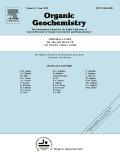
ORGANIC GEOCHEMISTRY
Transforming Knowledge in Earth and Planetary SciencesORGANIC GEOCHEMISTRY, published by PERGAMON-ELSEVIER SCIENCE LTD, is a pivotal journal in the field of geochemistry and petrology, dedicated to the exploration of organic compounds and their interactions within geological systems. Established in 1977, this journal has been an influential medium for researchers, providing significant insights and advancements that have shaped the understanding of organic geochemistry. With an impressive impact factor and a distinguished ranking of Q2 in its category, it sits at the forefront of academic research, currently holding the 46th position out of 154 in Earth and Planetary Sciences according to Scopus, which places it within the top 70th percentile. Although it operates on a subscription basis, ORGANIC GEOCHEMISTRY is recognized for its rigorous peer-review process, ensuring that only the highest quality research is published. Its scope includes an array of critical topics, appealing to geochemists, petrologists, students, and professionals looking to deepen their knowledge and contribute to this dynamic field. With converged publications extending into 2024, the journal continues to play a crucial role in the dissemination of cutting-edge research that addresses global challenges such as environmental change and resource management.
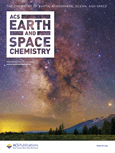
ACS Earth and Space Chemistry
Innovating Solutions for Planetary Challenges through ChemistryACS Earth and Space Chemistry is a leading journal published by the American Chemical Society, dedicated to advancing the interdisciplinary fields of atmospheric science, geochemistry, and planetary science. Since its inception in 2017, this journal has quickly established itself as a pivotal resource for researchers and professionals, boasting an impressive impact factor and securing its position in Q2 of the Scopus rankings for 2023 across its relevant categories. The journal publishes cutting-edge research articles, reviews, and commentaries that explore the chemical processes influencing Earth and space environments. By providing open access to invaluable research from experts around the globe, it encourages collaboration and dissemination of knowledge, crucial for addressing pressing environmental and planetary challenges. Situated in the heart of Washington, D.C., the journal's editorial office works diligently to ensure rigorous peer review and high-quality publications that meet the needs of its diverse audience, including scholars and students keen to stay abreast of developments in these dynamic fields.
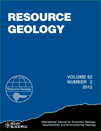
RESOURCE GEOLOGY
Advancing Knowledge in Geology and Resource ManagementRESOURCE GEOLOGY, published by WILEY, is a peer-reviewed journal that serves as a vital platform for the dissemination of innovative research in the fields of geology and geochemistry. With an ISSN of 1344-1698 and e-ISSN 1751-3928, the journal has steadily contributed to the academic community since its inception in 1996, continuing through its planned convergence in 2024. With a Q3 ranking in both Geochemistry and Petrology and Geology categories, RESOURCE GEOLOGY is positioned within the competitive landscape of Earth and Planetary Sciences, ranked 164th and 93rd in its respective categories on Scopus, reflecting its significant contribution to the body of knowledge in these fields. While not an open-access journal, it provides access to essential research that advances our understanding of natural resources and geological processes. The journal is dedicated to publishing high-quality articles that appeal to researchers, professionals, and students looking to deepen their insight into the intricate interplay between geological phenomena and resource management.
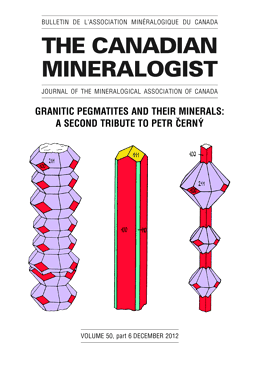
CANADIAN MINERALOGIST
Championing Innovative Research in MineralogyCANADIAN MINERALOGIST is a prestigious academic journal published by the Mineralogical Association of Canada, primarily focusing on the fields of Geochemistry and Petrology. Established in 1980, this journal has fostered a rich tradition of scholarly communication, offering a platform for researchers from around the world to share significant advancements and findings related to mineral science. With an impact factor that reflects its relevance within the scientific community, the journal occupies a notable position, ranked in the Q3 quartile within its category according to the 2023 assessments. The E-ISSN 1499-1276 ensures that online access is readily available, making it easier for readers to engage with cutting-edge research. With its headquarters in Quebec, Canada, CANADIAN MINERALOGIST not only contributes to the academic landscape in North America but also plays a vital role globally in advancing the understanding of mineralogy. Its commitment to high-quality publishing supports both the dissemination of knowledge and the nurturing of a vibrant scientific community.

GEOCHEMICAL JOURNAL
Exploring Earth's Secrets Through Geochemical InsightsGEOCHEMICAL JOURNAL, published by the Geochemical Society of Japan, stands as a pivotal platform for researchers and professionals dedicated to the fields of geochemistry and petrology, as well as geophysics. With the ISSN 0016-7002 and E-ISSN 1880-5973, this journal has been disseminating cutting-edge research since its inception in 1966 and continues to provide invaluable insights into the complexities of Earth's processes. Currently categorized in the Q3 quartile for both Geochemistry and Petrology and Geophysics, the journal ranks in the 40th and 36th percentiles, respectively, as per Scopus metrics, reflecting its growing influence and relevance in the scientific community. The journal accepts a range of scholarly articles, aiming to foster a deeper understanding of geochemical phenomena while promoting interdisciplinary collaboration among academicians and practitioners. Although not open access, the GEOCHEMICAL JOURNAL's commitment to quality research and education underscores its vital role in advancing the discourse within geoscience.
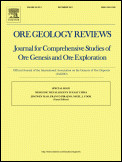
ORE GEOLOGY REVIEWS
Connecting Scholars in Ore GeologyORE GEOLOGY REVIEWS is a premier academic journal published by Elsevier, renowned for its influential contributions to the fields of Economic Geology, Geochemistry, and Petrology, and Geology. With its esteemed Q1 ranking across these disciplines in 2023, it occupies a leading position in shaping scholarly discussions and advancements within the geological sciences. With an impressive Scopus ranking—47th in Earth and Planetary Sciences for Geology, and among the top 40 in Geochemistry and Petrology—this journal serves as an essential resource for researchers, professionals, and students committed to advancing knowledge in ore geology. Having transitioned to an Open Access model in 2022, ORE GEOLOGY REVIEWS enhances the accessibility of high-quality research, promoting wider dissemination and engagement with cutting-edge findings from 1986 to 2024. As a valued publication addressing the intricacies of ore deposits and geochemical processes, it aims to foster interdisciplinary collaboration and innovation in the field.
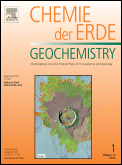
Geochemistry
Fostering Academic Excellence in GeochemistryGeochemistry is a distinguished academic journal published by Elsevier GmbH, focusing on the intricate study of geochemical processes across earth systems. With its ISSN 0009-2819 and E-ISSN 1611-5864, this journal serves as a crucial platform for scholars and researchers eager to disseminate their latest findings in geochemistry, petrology, and geophysics. The journal has established itself within the scientific community, achieving a Q2 ranking in both Geochemistry and Petrology as well as Geophysics, showcasing its significant impact and relevance—ranking 18th out of 165 in Geophysics and 26th out of 154 in Geochemistry and Petrology according to Scopus. From its inception in 1978 to its ongoing contributions through 2024, Geochemistry remains a vital resource for academic discourse and innovation in earth sciences. As an open-access title, it allows for broader dissemination of knowledge, promoting accessibility for researchers, students, and professionals. Whether you are engaged in theoretical research or applied studies, Geochemistry provides the insights necessary to advance our understanding of the planet's chemical complexity.